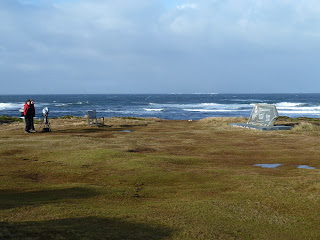~~~~~~~~~~~~~~~~~~~~~~~~~~~~~~~~~~~~~~~~~~~~~~~~~~~~~~~~~~
 |
| Two Sisters |
Thirty-one years ago, on the 12 June of
June 1982, the British forces attacked several strongholds of the
Argentine invaders, in the hills to the west of Stanley.
(I was going to apologise if I'd mentioned this before, but,
thinking about it, these sort of events where many men sacrificed
their lives, do bear repeating. They should not be forgotten. So no
apologies.)
 |
| The TV crew await the start of the service |
Three hills were the main targets that night, and Two Sisters mountain was at the centre of the
frontal assault on the entrenched Argentine troops. The men of 45 Commando had an
unenviable task of winkling out Argentine soldiers in their foxholes
and fortified positions. In order to reduce the casualty rate, as the
soldiers walked towards the enemy, all attacks were done at night.
 |
| The service |
As I had found
out on a recent Ramblers walk, even the most benign-looking landscape in the
Falklands can be a struggle to walk across, and navigation is tricky. At night, it must take exceptional fitness and skill (and courage, as minefields were all around in 1982).
In the end, some
troops were delayed getting into position for the attack, and the
decision was made to delay the start. This had the knock-on effect
of keeping HMS Glamorgan, which was providing covering artillery support, off-shore for longer than planned.
 |
| Laying of wreaths |
As the battles and night wore on, rather than
retire from the battle at the planned time, HMS Glamorgan stayed and fired
hundreds of shells into Argentine positions. This support was
crucial, and the hills were eventually taken after fierce fighting.
But Glamorgan now
had to run the gauntlet of a land-based Exocet missile launcher,
stationed at Surf Bay, to the east of Stanley.
 |
| Sleet showers to the east. |
In
order to regain the safety of the fleet before sunrise, Glamorgan
“cut the corner” and strayed within 20 miles of the Falklands' coast. The Exocet was launched, but was tracked by the crew on Glamorgan. Given the recent sinkings of British ships by Exocets, the captain decided to turn the ship at an acute angle to the incoming missile and this did prevent the ship from being holed.
However, the missile still exploded and also caused an onboard helicopter to explode. The ship was damaged, but it stayed afloat to fight again. The first to survive an Exocet hit.
Fourteen men were killed in the fires, and yesterday former comrades, current military representatives and Islanders turned out on Wednesday to remember their sacrifice.
Two days after the attack on Two Sisters, the Argentine troops surrendered. Liberation Day, June 14th, is a special day on the Falklands.
Peter

No comments:
Post a Comment